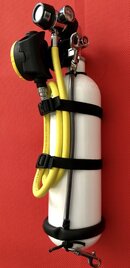NYCDiverBlue
Registered
Hello,
in this thread:
First time reg buyer: some questions
@tbone1004 wrote:
@tbone1004 thanks for you advice. I am curious, you wrote" First stages are unpredictable little buggers". This is a relative statement. Just how unreliable are first stages in your opinion? What do you think the failure rate is? Do Deep6 first stages fail in a way that is not fail safe(some would say that ACD first stages could fail in a way that is not fail safe as they close).
Please know that I am not being provocative as I am trying to decide which Deep6 set up to buy yet I am thinking ....really? .... in 100 dive trips(with proper maintenance) of a week long with 20 dives per trip, what would the failure rate be? in my VERY inexperienced mind, I would think it would be less than 1% over that total sample size. Maybe others could weigh in what would be the expected failure rate of first stages? Buying a spare first stage is like buying an insurance policy, yet since one could always rent(unless in remote area) a regulator if need be, one would want to weigh all the costs of buying(and carrying around) a spare first stage.
Thanks for any input.
in this thread:
First time reg buyer: some questions
@tbone1004 wrote:
I would highly recommend ordering a doubles regulator set so you have a spare first stage if you are travelling. First stages are unpredictable little buggers, and having a spare first stage is a great insurance policy to ensure you don't have to rent a regulator and miss a dive or two while you are travelling.
Deep 6 Signature Double Tank Regulator Package - Regulator Packages - Regulators
I'd also recommend going to Dive Gear Express and ordering an IP gauge which is a required tool IMO for all divers, especially those that own their own regulators
@tbone1004 thanks for you advice. I am curious, you wrote" First stages are unpredictable little buggers". This is a relative statement. Just how unreliable are first stages in your opinion? What do you think the failure rate is? Do Deep6 first stages fail in a way that is not fail safe(some would say that ACD first stages could fail in a way that is not fail safe as they close).
Please know that I am not being provocative as I am trying to decide which Deep6 set up to buy yet I am thinking ....really? .... in 100 dive trips(with proper maintenance) of a week long with 20 dives per trip, what would the failure rate be? in my VERY inexperienced mind, I would think it would be less than 1% over that total sample size. Maybe others could weigh in what would be the expected failure rate of first stages? Buying a spare first stage is like buying an insurance policy, yet since one could always rent(unless in remote area) a regulator if need be, one would want to weigh all the costs of buying(and carrying around) a spare first stage.
Thanks for any input.





